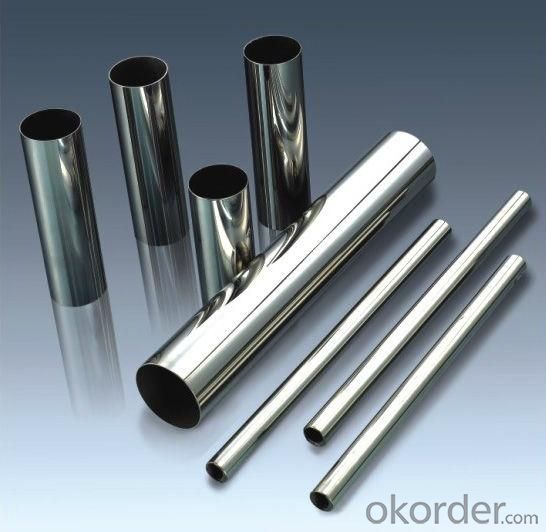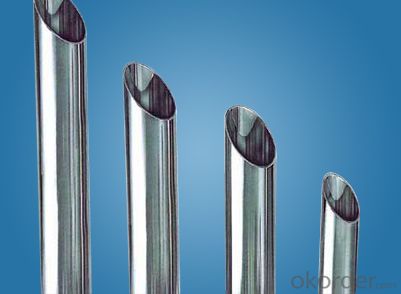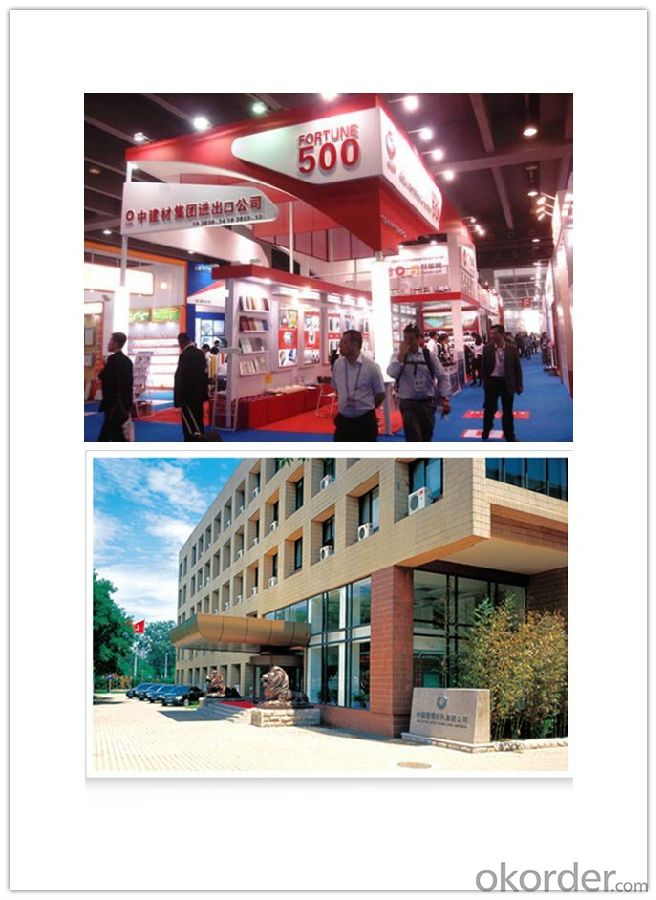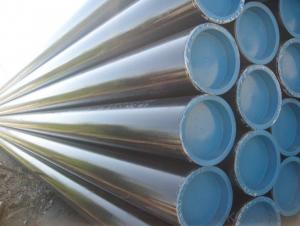Blacked Coated Hot Rolled High Carbon Seamless Steel Pipe
- Loading Port:
- Tianjin
- Payment Terms:
- TT OR LC
- Min Order Qty:
- 35 m.t.
- Supply Capability:
- 5000 m.t./month
OKorder Service Pledge
OKorder Financial Service
You Might Also Like
Item specifice
Blacked Coated Hot Rolled High Carbon Seamless Steel Pipe
1.Structure of Hot Rolled High Carbon Seamless Steel Pipe:
Seamless pipe is formed by drawing a solid billet over a piercing rod to create the hollow shell. As the manufacturing process does not include any welding, seamless pipes are perceived to be stronger and more reliable. Historically seamless pipe was regarded as withstanding pressure better than other types, and was often more easily available than welded pipe.
2.Main Features of the Hot Rolled High Carbon Seamless Steel Pipe:
• High manufacturing accuracy
• High strength
• Small inertia resistance
• Strong heat dissipation ability
• Good visual effect
• Reasonable price
3.Hot Rolled High Carbon Seamless Steel Pipe Specification:
Standard | GB, DIN, ASTM ASTM A106-2006, ASTM A53-2007 |
Grade | 10#-45#, 16Mn 10#, 20#, 45#, 16Mn |
Thickness | 8 - 33 mm |
Section Shape | Round |
Outer Diameter | 133 - 219 mm |
Place of Origin | Shandong, China (Mainland) |
Secondary Or Not | Non-secondary |
Application | Hydraulic Pipe |
Technique | Cold Drawn |
Certification | API |
Surface Treatment | factory state or painted black |
Special Pipe | API Pipe |
Alloy Or Not | Non-alloy |
Length | 5-12M |
Outer Diameter | 21.3-610mm |
Grade | 20#, 45#, Q345, API J55, API K55, API L80, API N80, API P110, A53B |
Standard | ASME, ASTM |
1) Material:20#(ASTM A 106/A53 GRB.API5LGRB,GB),45#,16Mn,10#.
2) Specification range:OD:21.3-610mm,WT:6-70mm,length:6-12m or according to the requirement of clients.
3) Excutive standards:GB,ASME API5L.ASTM A 106/A53,Despite of the above standards,we can also supply seamless steel pipe with standard of DIN,JIS,and so on,and also develop new products according to the requirements of our clients!
4) Surface:black lacquered,varnish coating or galvanized.
5) Ends:Beveled or square cut,plastic capped,painted.
6) Packing:bundles wrapped with strong steel strip,seaworthy packing.
4. Packing and Delivery:
Packaging Details: | seaworthy package,bundles wrapped with strong steel strip |
Delivery Detail: | 50-60days after received 30%TT or Original LC |
5. FAQ of Hot Rolled High Carbon Seamless Steel Pipe
A. How is the quality of your products?
Our products are manufactured strictly according to national and internaional standard, and we take a test on every pipe before delivered out. If you want see our quality certifications and all kinds of testing report, please just ask us for it.
Guaranteed: If products’ quality don’t accord to discription as we give or the promise before you place order, we promise 100% refund.
B. How about price?
Yes, we are factory and be able to give you lowest price below market one, and we have a policy that “ for saving time and absolutely honest business attitude, we quote as lowest as possible for any customer, and discount can be given according to quantity”,if you like bargain and factory price is not low enough as you think, just don’t waste your time.Please trust the quotation we would give you, it is professional one.
C. Why should you chose us?
Chose happens because of quality, then price, We can give you both.Additionally, we can also offer professional products inquiry, products knowledge train(for agents), smooth goods delivery, exellent customer solution proposals.Our service formula: good quality+good price+good service=customer’s trust
SGS test is available, customer inspection before shipping is welcome, third party inspection is no problem.
Any question, pls feel free to contact us !
6.Hot Rolled High Carbon Seamless Steel Pipe Images:


7. Company Information:
CNBM International Corporation (CNBM International) is the most important trading platform of CNBM Group Corporation, a state-owned company under the direct supervision of State-owned Assets Supervision and Administration Commission of the State Council.
Since 2004, the trading volume of CNBM International has been doubled in 5 successive years owing to the support of superior corporations and effort of all staff. Meanwhile, we have established strategic partnerships with hundreds of domestic manufacturers and sound business relations with clients from over 120 countries. In line with the business, CNBM International launched E-business platform Okorder.com.Our goal is to transform CNBM International into the global leading brand in building materials industry within 3 to 5 years through innovation and reform, by strengthening the overall management of supply chain, developing and cultivating both domestic and overseas market, improving the procedure and information system, enhancing the ability to organize resources and to provide value-added services under a professional team and a learning organization.

- Q:Can galvanized pipe be welded with seamless steel tube? What should I do to connect?
- Processing method is very simple, I suggest you add blue disk connection, you can not use welding ~ ~ ~!The gas pipe is the best galvanized pipe, mainly play a role in anti-corrosion ~ ~ ~ ~ if you must use seamless connection can.When welding, can open a certain groove, use galvanized material electrode, but the premise is must be welded with seamless tube firmly.
- Q:What are the factors to consider while selecting steel pipes for a project?
- When selecting steel pipes for a project, there are several important factors to consider. These factors include the material composition of the steel, the pipe dimensions, the intended application, the environmental conditions, and the budget. 1. Material Composition: The material composition of the steel pipes is crucial as it determines the pipes' strength, corrosion resistance, and durability. Common types of steel used for pipes include carbon steel, stainless steel, and alloy steel. Each type has its own set of properties and is suitable for different applications. 2. Pipe Dimensions: The dimensions of the steel pipes, such as diameter and wall thickness, should be carefully considered. The pipe dimensions must be compatible with the project requirements and the system in which the pipes will be installed. It is essential to ensure that the selected pipes can handle the required flow rates and pressures. 3. Intended Application: The specific application of the steel pipes should be thoroughly assessed. Different projects may require pipes with varying characteristics, such as heat resistance, pressure resistance, or the ability to transport specific substances like gas, oil, or water. Understanding the application requirements will help in choosing the appropriate type of steel pipes. 4. Environmental Conditions: The environmental conditions in which the pipes will be installed must be evaluated. Factors such as temperature variations, exposure to moisture, corrosive substances, and external pressures should be taken into account. For instance, if the project involves underground installation or exposure to corrosive chemicals, corrosion-resistant steel pipes may be necessary. 5. Budget: The budget available for the project is also an important factor to consider. The cost of steel pipes can vary depending on their material composition, dimensions, and additional features. It is crucial to strike a balance between the project requirements and the available budget to ensure cost-effectiveness without compromising the quality and performance of the pipes. In conclusion, when selecting steel pipes for a project, it is important to consider factors such as the material composition, pipe dimensions, intended application, environmental conditions, and budget. By carefully evaluating these factors, one can choose the most suitable steel pipes that meet the project requirements and ensure long-term performance and durability.
- Q:Can steel pipes be used for conveying hazardous chemicals?
- Yes, steel pipes can be used for conveying hazardous chemicals. Steel pipes are known for their high strength and durability, making them suitable for handling various substances, including hazardous chemicals. They can withstand high pressure and temperature, ensuring the safe transportation of these chemicals. Additionally, steel pipes have excellent resistance to corrosion, which is crucial when dealing with corrosive and potentially dangerous substances. Moreover, steel pipes can be easily welded and connected, allowing for a secure and leak-proof transport system. However, it is important to consider the specific requirements of the chemicals being transported and ensure that the steel pipes are properly designed, coated, and maintained to prevent any potential risks or reactions with the hazardous substances.
- Q:What are the different methods of bending steel pipes?
- There are several methods of bending steel pipes, including hot bending, cold bending, induction bending, rotary draw bending, and hydraulic pipe bending.
- Q:Can steel pipes be used for irrigation pumps?
- Yes, steel pipes can be used for irrigation pumps. Steel pipes are commonly used in irrigation systems due to their durability, strength, and resistance to corrosion. They are ideal for transporting water from the pump to the irrigation system, ensuring efficient water distribution for agricultural purposes.
- Q:Can steel pipes be used for plumbing?
- Yes, steel pipes can be used for plumbing. Steel pipes are commonly used for plumbing applications due to their strength, durability, and resistance to corrosion. However, other materials such as copper and PVC are also commonly used depending on the specific requirements and preferences of the plumbing system.
- Q:What are the different types of steel pipe connections for oil and gas pipelines?
- The different types of steel pipe connections for oil and gas pipelines include threaded connections, welded connections, and flanged connections. Threaded connections involve screwing the pipes together using a threaded end, which ensures a secure fit. Welded connections involve permanently joining the pipes together using welding techniques such as butt welding or socket welding. Flanged connections involve attaching flanges to the ends of the pipes and bolting them together, providing a strong and leak-proof connection.
- Q:How to calculate the maximum bending stress of steel pipe? Is there a list of the maximum flexural normal stresses for steel pipes of different materials and diameters?
- Strength design of steel pipe by this formula to calculate the maximum normal stress in the steel pipe should be less than the value (based on your choice of different grades of steel, steel strength design value is not the same, this value can also be found through the design manual of steel structure), meet the requirements, it can meet the requirements of steel pipe under the action of bending moment strength.
- Q:How are steel pipes affected by international trade policies?
- Steel pipes can be significantly impacted by international trade policies. Trade policies, such as tariffs or quotas, can increase the cost of importing steel pipes, making them more expensive for domestic consumers. On the other hand, trade policies that promote free trade can lead to increased competition and potentially lower prices for steel pipes. Additionally, trade policies may also affect the availability of certain types of steel pipes, depending on the regulations and restrictions imposed by different countries. Overall, international trade policies play a crucial role in shaping the market dynamics and influencing the supply, demand, and pricing of steel pipes.
- Q:What are the factors to consider when selecting pipe materials for corrosive environments?
- When selecting pipe materials for corrosive environments, there are several important factors to consider in order to ensure the longevity and effectiveness of the piping system. 1. Corrosion Resistance: The most crucial factor to consider is the corrosion resistance of the pipe material. It is essential to choose a material that is highly resistant to corrosion, as corrosive environments can cause significant damage to pipes over time. Materials such as stainless steel, fiberglass, and certain types of plastics like PVC and CPVC are known for their excellent resistance to corrosion. 2. Chemical Compatibility: It is important to assess the chemical compatibility of the pipe material with the specific corrosive environment it will be exposed to. Different materials have different resistance levels to various chemicals, so it is crucial to ensure that the chosen material can withstand the specific chemicals present in the environment. Consulting chemical compatibility charts and seeking expert advice can help in making the right material selection. 3. Temperature and Pressure Requirements: The temperature and pressure conditions within the corrosive environment should also be considered when selecting pipe materials. Some materials may have limitations in terms of their temperature and pressure resistance, and exceeding these limits can lead to pipe failure. It is important to choose a material that can handle the required temperature and pressure ranges without compromising its structural integrity. 4. Cost: The cost of the pipe material and its installation should also be taken into account. While certain materials may be highly resistant to corrosion, they can also be more expensive. It is essential to strike a balance between the desired level of corrosion resistance and the available budget. 5. Maintenance and Durability: The maintenance requirements and overall durability of the pipe material should be evaluated as well. Some materials may require more frequent inspections, cleaning, or repairs compared to others. Considering the anticipated lifespan of the piping system and the ease of maintenance can help in selecting a material that will provide long-term reliability and cost-effectiveness. In conclusion, when selecting pipe materials for corrosive environments, one should consider factors such as corrosion resistance, chemical compatibility, temperature and pressure requirements, cost, and maintenance and durability. By carefully evaluating these factors, one can choose a pipe material that best suits the specific corrosive environment and ensures a reliable and long-lasting piping system.
1. Manufacturer Overview |
|
|---|---|
| Location | |
| Year Established | |
| Annual Output Value | |
| Main Markets | |
| Company Certifications | |
2. Manufacturer Certificates |
|
|---|---|
| a) Certification Name | |
| Range | |
| Reference | |
| Validity Period | |
3. Manufacturer Capability |
|
|---|---|
| a)Trade Capacity | |
| Nearest Port | |
| Export Percentage | |
| No.of Employees in Trade Department | |
| Language Spoken: | |
| b)Factory Information | |
| Factory Size: | |
| No. of Production Lines | |
| Contract Manufacturing | |
| Product Price Range | |
Send your message to us
Blacked Coated Hot Rolled High Carbon Seamless Steel Pipe
- Loading Port:
- Tianjin
- Payment Terms:
- TT OR LC
- Min Order Qty:
- 35 m.t.
- Supply Capability:
- 5000 m.t./month
OKorder Service Pledge
OKorder Financial Service
Similar products
New products
Hot products
Related keywords






























